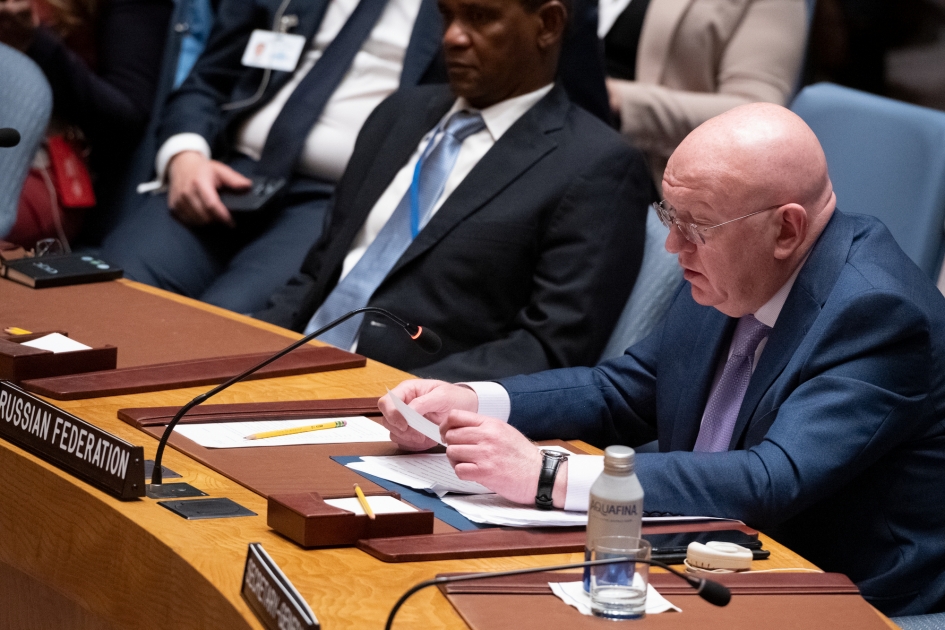Statement by Permanent Representative Vassily Nebenzia at UNSC debate "Ensuring the security and dignity of civilians in conflict: addressing food insecurity and protecting essential services"
Mme.President,
We thank the briefers.
The situation with food security is a serious problem for the global community. Its reasons are versatile; they started long before the present day. Not only armed conflicts, but also unilateral sanctions by Western states play a role here, and not the least one for that matter.
Using hunger as a method of warfare cannot be justified. This rule was definitively stipulated in the First Additional Protocol to the Geneva Conventions relative to the Protection of Civilian Persons in Time of War. Thereby it must be remembered that this norm appeared after the siege of Leningrad by Nazi German and Finnish troops, when the city was surrounded with a view to exterminating its residents by starving to death. The use of hunger as a weapon of war in Leningrad killed more than 600,000 people.
In today’s armed conflicts, a particular threat is posed by terrorist and extremist groups that follow no rules when waging wars. The ongoing build-up of terrorist threat in the Sahel, as well as ISIL-Khorasan terrorist group in Afghanistan, which targets religious and ethnical minorities, is a special concern.
In Syria and Yemen, the situation is stabilizing, however the humanitarian situation remains dire. There is scarcity of basic necessity items, including food and medications. Speaking of Syria, we see it (i.a. from the Secretary-General’s report on protection of civilians) that the main problems have been caused by the illegal interference in internal affairs and the occupation of the country. They are the effects of air strikes by the so-called foreign coalition and activities by terrorist formations in the areas that are not controlled by Damascus, which are responsible for the majority of all crimes committed.
Civilian population continues to suffer in Syrian territories that are occupied by the United States and their subordinate forces, including from the pillaging of natural resources. The disastrous situation in camps Rukban, Al-Hol, and Roj that are situated on the US-controlled territory has remained so for years. We call on the Secretary-General to keep tracking this concern-raising aspect and be more active when raising global awareness of this matter.
The dire humanitarian situation in Syria to a large extent has been caused by the fact that the United States and the European Union continue to use illegitimate unilateral sanctions against the Syrians that trigger devastating consequences for the civilians. As we take it from the SG report, sanctions have a negative impact on providing humanitarian assistance, which may be a lifesaver for people in the conflict zone. This is true not only for Syria. We call on the Secretary-General to continue looking into this issue. By the way, the specialized report on Syria that was due in January has not been released yet.
We are convinced that hunger is also a method of economic warfare that the West is carrying out worldwide. They arbitrarily curb opportunities for trade in food. The situation around the Black Sea Initiative is one of the manifestations of this tactic. We already shared our assessments to the point at the Security Council briefing on the humanitarian situation in Ukraine on 15 May, and we will continue attracting attention to the real situation.
Here are just a few pieces of statistical data. The least developed countries receive less than 3 % of all exports that are facilitated via the Black Sea Initiative. Over 10 months of its existence in the WFP humanitarian framework, only 600,000 tonnes of food out of 30,000,000 tonnes were exported from Ukrainian ports. The majority of this went to the developed states.
We would like to underscore specifically the issue of ammonia exports that was stipulated in the Istanbul agreements. This can ensure export of 2.5 million tonnes of raw materials sufficient to produce 7 million tonnes of fertilizers. This amount of fertilizer would allow to produce enough food to supply to 200 million people. These deliveries should have started at the same time as those of Ukrainian food. However this never happened.
As of today, almost one year after the Black Sea Initiative was launched, the deficit of ammonia on the world markets stands at 70% due to the shortfall in volumes.
As for the Russia-UN Memorandum of Understanding on exports of Russian food, it never even started to be implemented. The EU and US claim hypocritically that there be no sanctions impacting the exports of food and fertilizers. At the same time, they deny access to SWIFT for the Russian bank “Rosselkhozbank”. Other logistical problems (shipping traffic, insurance, deliveries of agricultural equipment) that were caused by sanctions and that we highlighted repeatedly also remain unresolved.
Basically, Kiev and its Western sponsors block the export of food and fertilizers while blaming others. Despite all this ploy around the agreements, we are still committed to the goal of contributing to global food security, first of all of the developing states while overcoming all artificial barriers that are set up by the West. Whatever our grain and fertilizer exporters have achieved has been the result of their own efforts. Neither the United Nations nor so-called Western exemptions have anything to do with it. Russia remains one of the key global supplier of agricultural products. We have established ourselves as a reliable and predictable partner. And that’s exactly how we intend to proceed.
Thank you.
